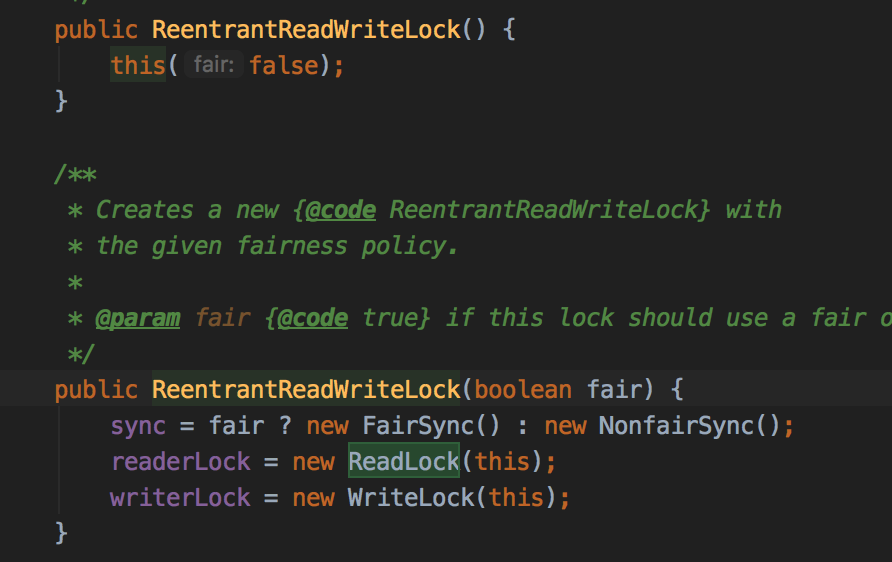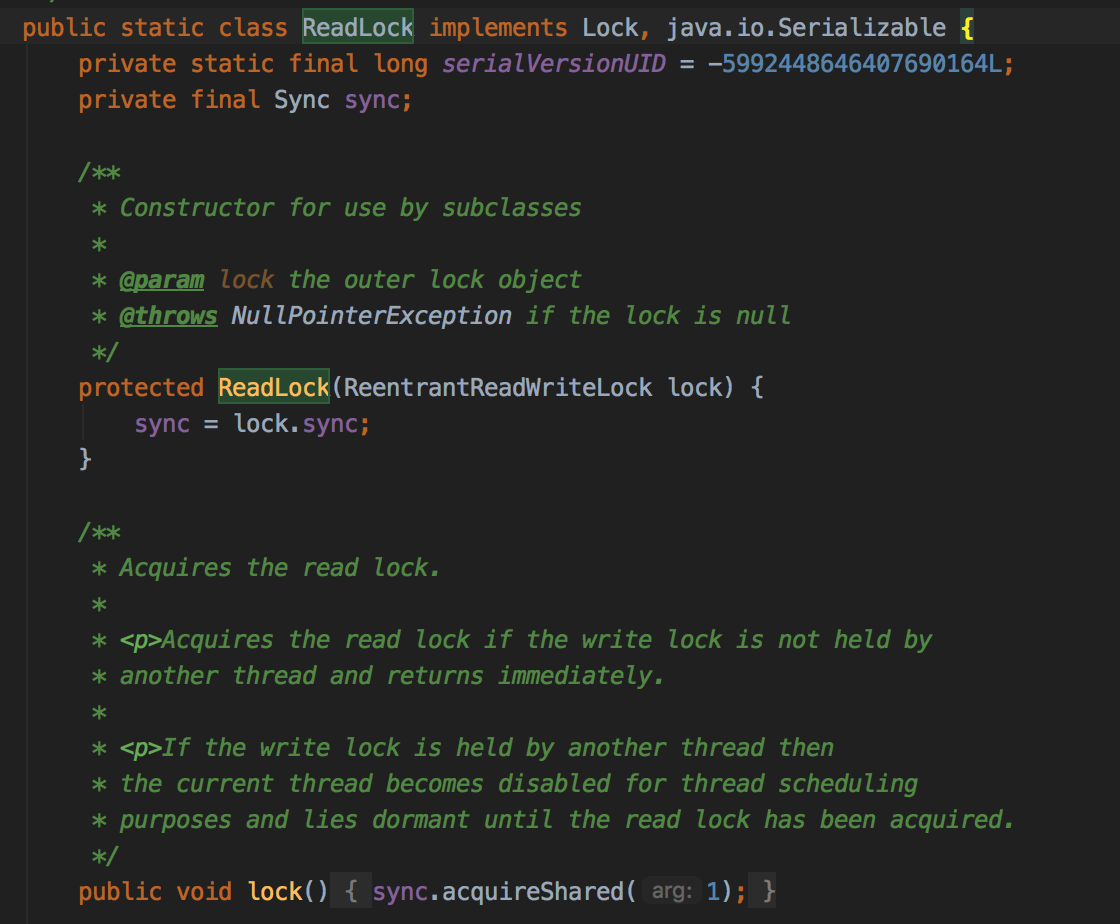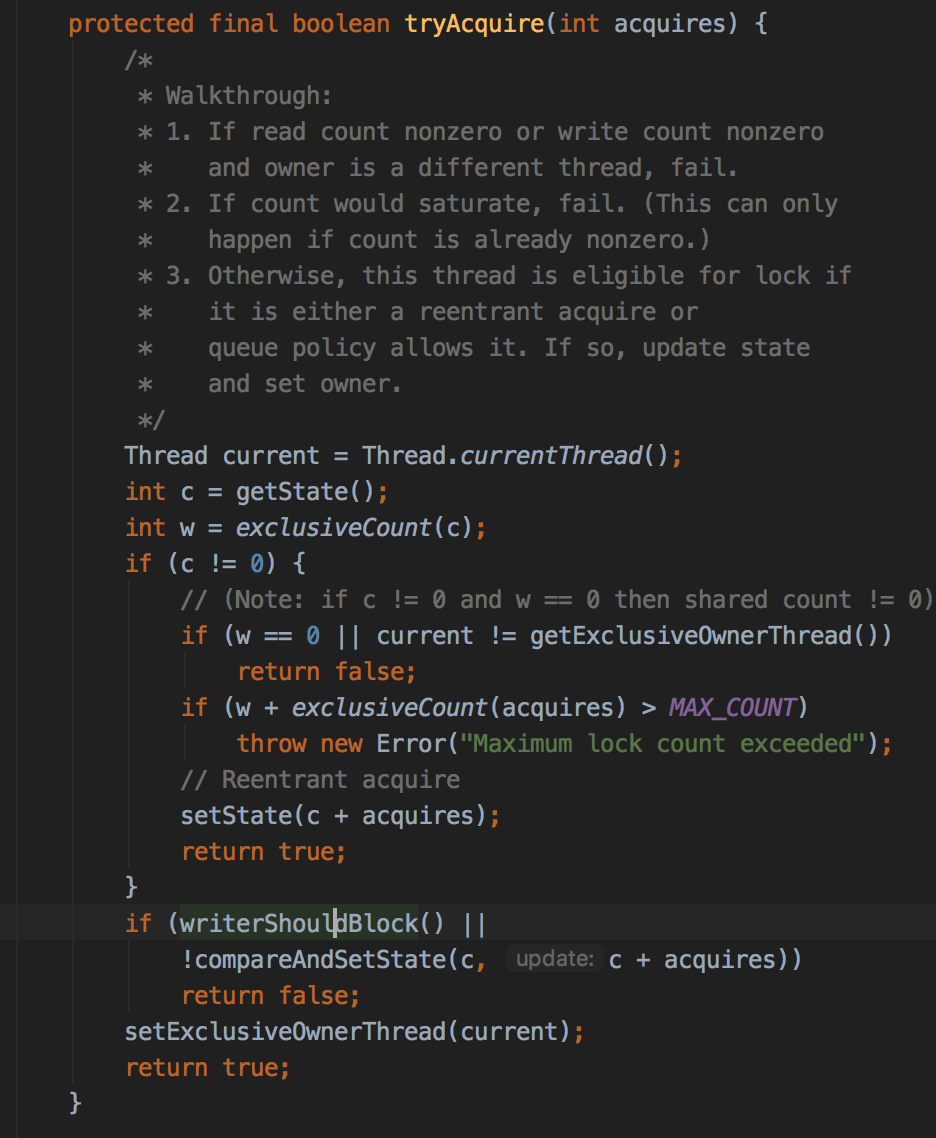读写锁

ReadLock:

都是委托给外部类的sync对象:

获取读锁:
protected final int tryAcquireShared(int unused) {
/*
* Walkthrough:
* 1. If write lock held by another thread, fail.
* 2. Otherwise, this thread is eligible for
* lock wrt state, so ask if it should block
* because of queue policy. If not, try
* to grant by CASing state and updating count.
* Note that step does not check for reentrant
* acquires, which is postponed to full version
* to avoid having to check hold count in
* the more typical non-reentrant case.
* 3. If step 2 fails either because thread
* apparently not eligible or CAS fails or count
* saturated, chain to version with full retry loop.
*/
Thread current = Thread.currentThread();
int c = getState();
//已经有别的线程持有互斥锁
if (exclusiveCount(c) != 0 &&
getExclusiveOwnerThread() != current)
return -1;
int r = sharedCount(c);
if (!readerShouldBlock()//公平锁检查队列是否有元素 有的话返回true,非公平锁同样检查,但队列第一个元素是读,返回false
&&
r < MAX_COUNT &&//2^16-1最大共享锁数
compareAndSetState(c, c + SHARED_UNIT)) {
if (r == 0) {//第一个持有读锁
firstReader = current;
firstReaderHoldCount = 1;
} else if (firstReader == current) {
firstReaderHoldCount++;//重入
} else {
HoldCounter rh = cachedHoldCounter;
if (rh == null || rh.tid != getThreadId(current))
cachedHoldCounter = rh = readHolds.get();
else if (rh.count == 0)
readHolds.set(rh);
rh.count++;
}
return 1;
}
//前面应该是fast-path?
return fullTryAcquireShared(current);
}

/**
* Full version of acquire for reads, that handles CAS misses
* and reentrant reads not dealt with in tryAcquireShared.
*/
final int fullTryAcquireShared(Thread current) {
/*
* This code is in part redundant with that in
* tryAcquireShared but is simpler overall by not
* complicating tryAcquireShared with interactions between
* retries and lazily reading hold counts.
*/
HoldCounter rh = null;
for (;;) {
//自旋
int c = getState();
if (exclusiveCount(c) != 0) {
if (getExclusiveOwnerThread() != current)
return -1;
// else we hold the exclusive lock; blocking here
// would cause deadlock.
} else if (readerShouldBlock()) {//相比fast-path这里处理了应该阻塞的情况。后面逻辑相似
// Make sure we're not acquiring read lock reentrantly
if (firstReader == current) {
// assert firstReaderHoldCount > 0;
} else {
if (rh == null) {
rh = cachedHoldCounter;
if (rh == null || rh.tid != getThreadId(current)) {
rh = readHolds.get();
if (rh.count == 0)
readHolds.remove();
}
}
if (rh.count == 0)
return -1;
}
}
if (sharedCount(c) == MAX_COUNT)
throw new Error("Maximum lock count exceeded");
if (compareAndSetState(c, c + SHARED_UNIT)) {
if (sharedCount(c) == 0) {
firstReader = current;
firstReaderHoldCount = 1;
} else if (firstReader == current) {
firstReaderHoldCount++;
} else {
if (rh == null)
rh = cachedHoldCounter;
if (rh == null || rh.tid != getThreadId(current))
rh = readHolds.get();
else if (rh.count == 0)
readHolds.set(rh);
rh.count++;
cachedHoldCounter = rh; // cache for release
}
return 1;
}
}
}
可以看到只要没有写锁,和队列里没有排队,就一定能拿到读锁。
看下写锁:

可以看到写锁,并没有管读锁的状态,只关注写锁,这样的话就写锁cas失败就入队了,后续的读锁也都会入队
其实读写线程入队的原因都是有写进程或写请求的存在,因为队列的问题,不存在课本上的写者优先和读者优先的问题,开始排队后都是等待时间决定




 浙公网安备 33010602011771号
浙公网安备 33010602011771号